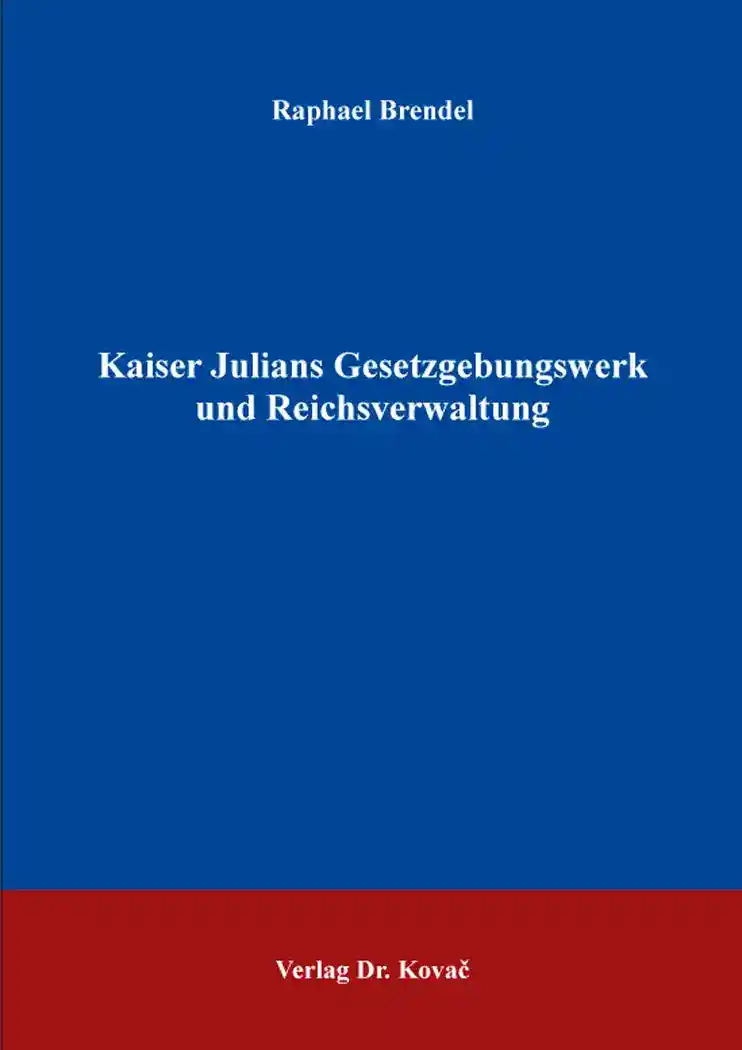Raphael BrendelKaiser Julians Gesetzgebungswerk und Reichsverwaltung
Studien zur Geschichtsforschung des Altertums, volume 32
Hamburg 2017, 532 pages
ISBN 978-3-8300-9297-1 (print)
ISBN 978-3-339-09297-7 (eBook)
Rezensionen
[…] Gemessen an der Kürze seiner Alleinherrschaft von nicht einmal zwei Jahren ist die Literaturproduktion zu Kaiser Julian (reg. 361-363 n.Chr.) exorbitant […]. Enorm ist auch der Umfang von B(rendel)s Münchener Dissertation, nicht nur der reinen Seitenzahl, sondern auch der verarbeiteten Quellen und Literatur (62 engbedruckte Seiten!) nach. Und doch setzt er sich wohltuend von vielen anderen Forschungsbeiträgen zu Julian ab.[…] hat B. die Julian-Forschung ebenso wie Intrerpretationsmöglichkeiten für kaiserliches Handeln als Ganzes deutlich vorangebracht.
[... Brendel] ist […] eine breite Leserschaft zu wünschen.
[…] The present book is a fine piece of scholarship that makes a significant contribution to change this state of affairs and lays a solid foundation for future work. Brendel deserves special praise for his sound argumentation, for his careful collection of relevant source material, and for his thorough review of all research literature.
[…] Die Frage nach dem Inhalt aller Gesetze Julians, ihren formalen Aspekten wie auch dem jeweiligen historischen Kontext hat der Verf. umfassend und auch umsichtig beantwortet, und so wird seine Dissertation sicherlich über viele Jahre das grundlegende Referenzwerk für die Gesetzgebung des Kaisers Julian bleiben.
[…] fehlt eine Gesamtanalyse der julianischen Gesetze […]. Diese Lücke in der Julianforschung schließt die nun publizierte Münchner Dissertation von Raphael Brendel. […]Schon eine oberflächliche Betrachtung lässt […] den Wert des Bandes für die weitere Forschung erkennen, da […] alle julianischen Gesetze untersucht werden, wobei Brendel die nationale wie die internationale Forschungsliteratur bis hin zur entlegensten Rezension berücksichtigt. Diese detaillierte Grundlagenforschung ermöglicht es, den Untersuchungsteil des Bandes, auch dank der umfangreichen Indizes im Anhang, wie ein Handbuch zu nutzen. […]
Das Verdienst Brendels ist es, die Gesetze, die Kaiser Julian während seiner Regierungszeit erlassen hatte, grundlegend und zutreffend untersucht zu haben. Selbst wenn man nicht in jedem Punkt mit ihm übereinstimmt, bietet der Band aufgrund der umfänglichen Auseinandersetzung mit der Forschungsliteratur Anknüpfpunkte und eine Diskussionsgrundlage, von der die künftige Forschung auszugehen hat. Besonders hervorzuheben ist dabei die Berücksichtigung der Kommentarwerke zu den Kodizes. […]
About this book deutschenglish
While there are numerous studies of the religious policy of Julian the „Apostate“, the last pagan emperor of Rome, his legislative activity has not received much attention, except for a few laws that have been considered as part of his religious policy.
This study offers a comprehensive collection, translation and analysis of the laws connected to Julian. Besides exegesis of the texts of individual laws the main questions are: Can overriding motivations, such as hostility to Christianity and/or Constantine, be discerned in Julian's legislation? Can he really be seen as a great reforming emperor? And how did his successors react to the laws he issued?
The study also attempts to use the concrete example of Julian to improve our knowledge of late antique legislation in general: What did innovations and simple confirmations of already valid laws mean? When can an ancient or late antique law be considered successful? How did the compilers of the late antique law codes select and rework the text of the laws?
This is also the first attempt ever to consult the late antique and early medieval commentaries on the great law codes as sources for the study of the laws under discussion. The additional information given by the commentators turns out to provide much useful evidence for better understanding of individual laws.
The study reaches the conclusion that Julian's legislation was strongly influenced by pragmatism and day-to-day necessities: its aim was to solve emerging problems without causing too much change. Julian's laws are therefore neither part of a great reform nor the legislative part of his religious policy. However, the realization that as a legislator Julian is much more similar to his predecessors and successors than has sometimes been thought means that the results of this study can additionally provide a basis for further studies in the legislation of late antiquity.
